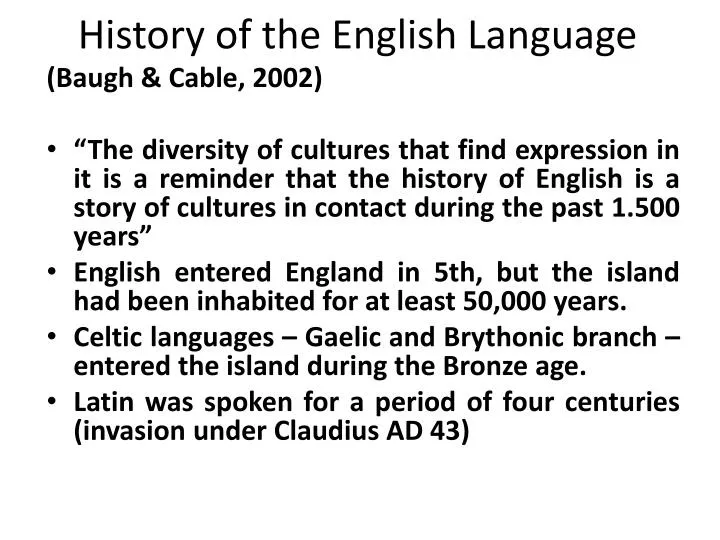The english language can only be dated back to the fifth century

The English Language: A Journey through Time

The English language is a fascinating tapestry that has evolved over centuries, shaping the way we communicate and connect with one another. While it may seem like English has always been around, its origins can actually be traced back to the fifth century.
Emergence and Evolution
English emerged from the dialects spoken by various Germanic tribes, particularly the Angles, Saxons, and Jutes, who migrated to what is now known as England during the early Middle Ages. These tribes spoke what is referred to as Old English, a Germanic language heavily influenced by Latin, Celtic, and Norse languages. Old English bears little resemblance to the English we speak today, characterized by complex grammar and a vast vocabulary with deep roots in Germanic origins.
Over time, Old English began to evolve primarily due to external influences. The Norman Conquest in 1066 introduced French, Dutch, and Latin influences to the language, leading to the period known as Middle English. During this era, English absorbed a significant number of French words, shaping the vocabulary we use today. Middle English is often associated with Geoffrey Chaucer’s renowned work, “The Canterbury Tales,” written in the late 14th century.
The Renaissance and Modern English

The Renaissance period marked a turning point for the English language, as scholars sought to revive classical knowledge and literature. This period, coupled with the invention of the printing press by William Caxton, contributed to the standardization of English. These developments opened the doors to wider literacy and communication, promoting the growth of the language.
However, it was not until the late 16th century that English truly started its transformation into what we now know as Modern English. With the works of prominent playwrights like William Shakespeare, the language became richer, more complex, and began to embrace new words and expressions. English continued to evolve and adapt to societal changes, as evidenced by the rise of scientific literature and the global influence of the British Empire.
English Today
Today, English is one of the most widely spoken languages in the world, acting as a lingua franca for international communication. It has embraced influences from various languages, including Latin, Greek, French, and many others. With hundreds of millions of native speakers and even more individuals using it as a second language, the power and reach of the English language are undeniable.
In conclusion, while the English language can be dated back to the fifth century, its journey has been one of constant change and development. From its humble Germanic roots to its expansion through conquests and cultural exchanges, English has evolved into a dynamic and adaptable means of communication. It continues to shape and be shaped by the world around us, playing a pivotal role in our interconnected society.
Sources:
Related Posts
Quick Links
Legal Stuff

